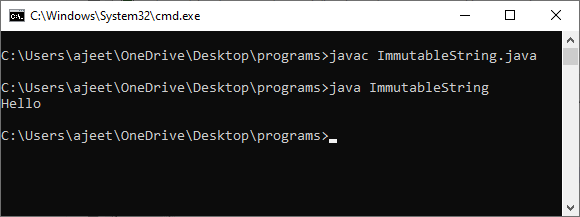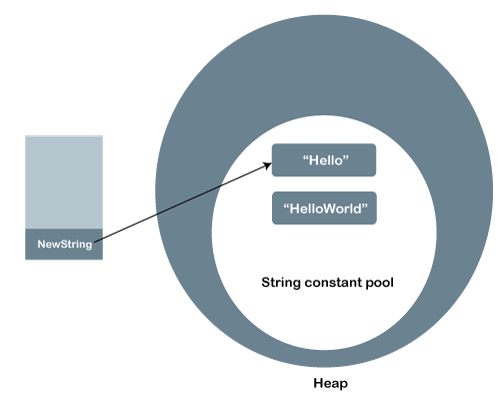Why Are Strings Immutable in Java? Checking Out the Design Choices
Why Are Strings Immutable in Java? Checking Out the Design Choices
Blog Article
What Is Unalterable Strings and Exactly How It Works
In the realm of programming, recognizing the idea of unalterable strings is critical for producing robust and safe applications. Unalterable strings refer to strings that can not be changed after they are produced, making certain information honesty and predictability within the code. This fundamental concept plays a vital function in different shows languages and offers an one-of-a-kind technique to dealing with data. By checking out the ins and outs of how immutable strings work, one can reveal a world of benefits and possibilities that can elevate the quality and performance of software application development.
The Basics of Unalterable Strings
Immutable strings, as a basic concept in programs, are personality sequences that can not be transformed as soon as they are created. This means that when a string is designated a value, that worth can not be modified. In languages like Python and Java, strings are immutable things, leading to various effects in terms of memory monitoring and information honesty.
One of the vital benefits of immutable strings is that they offer a feeling of safety in information adjustment. Because the content of an unalterable string can not be changed, it guarantees that the initial information remains undamaged, reducing the threat of unexpected modifications during program execution (Why are strings immutable in Java?). This residential or commercial property also streamlines debugging processes, as developers can trust that once a string is specified, its value will certainly not be accidentally changed
In addition, immutable strings help with efficient memory use. When a brand-new string is developed based on an existing one, instead of changing the initial string, the new value is saved separately. This approach boosts performance by reducing memory fragmentation and streamlining memory allocation processes. On the whole, understanding the fundamentals of unalterable strings is essential for mastering shows principles and optimizing code performance.
Advantages of Immutable Strings
Building upon the security and effectiveness advantages of unalterable strings, their advantages reach boosting code reliability and simplifying concurrent programming tasks. By being immutable, strings can not be changed after creation, which gets rid of the risk of unplanned adjustments in the data they keep. This fundamental immutability makes sure that as soon as a string is developed, its value continues to be consistent throughout the program's execution, reducing the possibilities of pests triggered by unforeseen changes.
In addition, immutable strings add to code integrity by making it easier to reason concerning the state of a program. Because strings can not be changed, programmers can trust that a string will certainly always hold the same worth, simplifying debugging and maintenance initiatives. This predictability results in extra trustworthy and steady codebases.

Execution in Programming Languages
Within various check programming languages, the consolidation of immutable strings is a basic facet that influences how data is managed and controlled within code frameworks. The application of immutable strings varies throughout different programs languages, with each language using its own mechanisms to support this principle.

In comparison, languages like C and C++ do not have built-in assistance for immutable strings. Developers in these languages need to by hand execute immutability by enforcing regulations within their code to stop direct modifications to string items.
Best Practices for Collaborating With Unalterable Strings
When handling immutable strings in programming languages like Java and Python, sticking to ideal practices makes sure protected and reliable information manipulation. One of the essential finest techniques is to make use of StringBuilder or StringBuffer rather of straight adjusting strings, particularly when taking care of extensive concatenation operations. These courses give mutable choices for string adjustment, assisting to prevent unnecessary memory allocations and improving performance.
Another best method is to make use of string interpolation or formatting works provided by the language rather than manual concatenation. This not only boosts readability yet additionally aids in preventing common risks such as unintended string alterations. In addition, when functioning with delicate information such as look at this website passwords or API secrets, it is important to prevent storing them as plain text in unalterable strings. Using protected storage devices like char arrays or specialized collections for managing delicate information aids alleviate safety risks connected with immutable strings.
Real-world Applications and Examples
Exploring functional applications of immutable strings in numerous industries exposes their significant effect on data integrity and system integrity. In the healthcare market, unalterable strings play a critical duty in ensuring the safety and security and privacy of individual information. By stopping unauthorized alterations to delicate details such as clinical documents and prescriptions, unalterable strings assist keep conformity with stringent privacy laws like HIPAA.
Banks also take advantage of the unalterable nature of strings to improve the safety and security of consumer data and purchase records. Unalterable strings help protect against fraud and unauthorized changes to monetary details, offering a robust defense against cyber hazards and ensuring the depend on and self-confidence of clients.

Verdict
Finally, unalterable strings are dealt with and unchangeable series of personalities that use benefits such as string safety and enhanced efficiency in programs. They are executed in numerous programs languages to make certain information integrity and security. Finest methods for working with immutable strings include avoiding direct adjustments and making use of techniques that return brand-new string objects. Real-world applications of immutable strings include data file encryption, caching, and string manipulation tasks.
Unalterable strings refer to strings that can not be modified after they are produced, making sure information stability and predictability within the code. When a new string is produced based on an existing one, rather than customizing the original string, the new value is kept independently.In languages like Java and Python, strings are immutable by default, meaning that once a string item is created, its worth can not be changed - Why are strings immutable in Java?. Finest methods for functioning with immutable strings include staying clear of direct alterations and utilizing approaches that return new string official site objects. Real-world applications of unalterable strings include data encryption, caching, and string manipulation jobs
Report this page